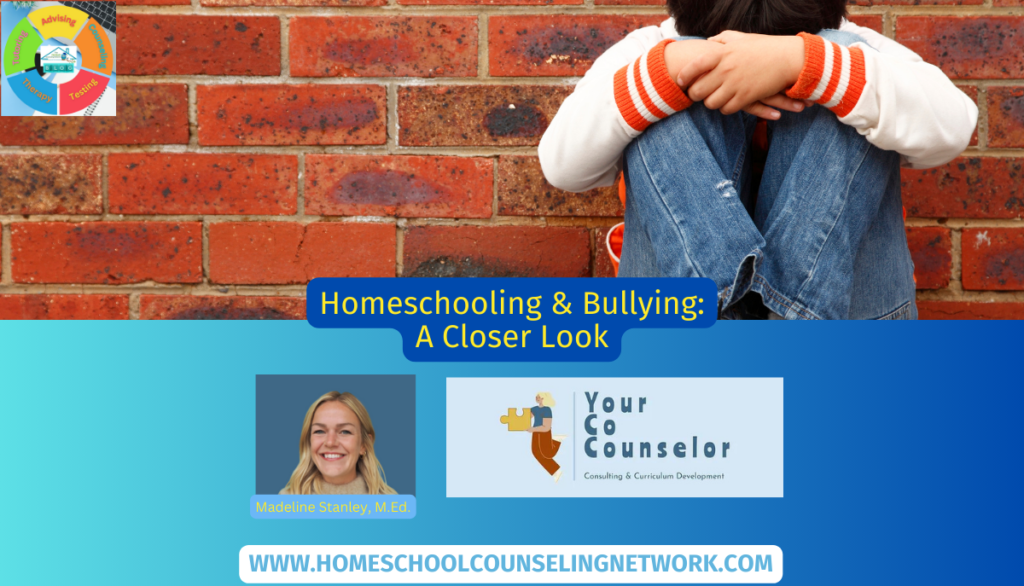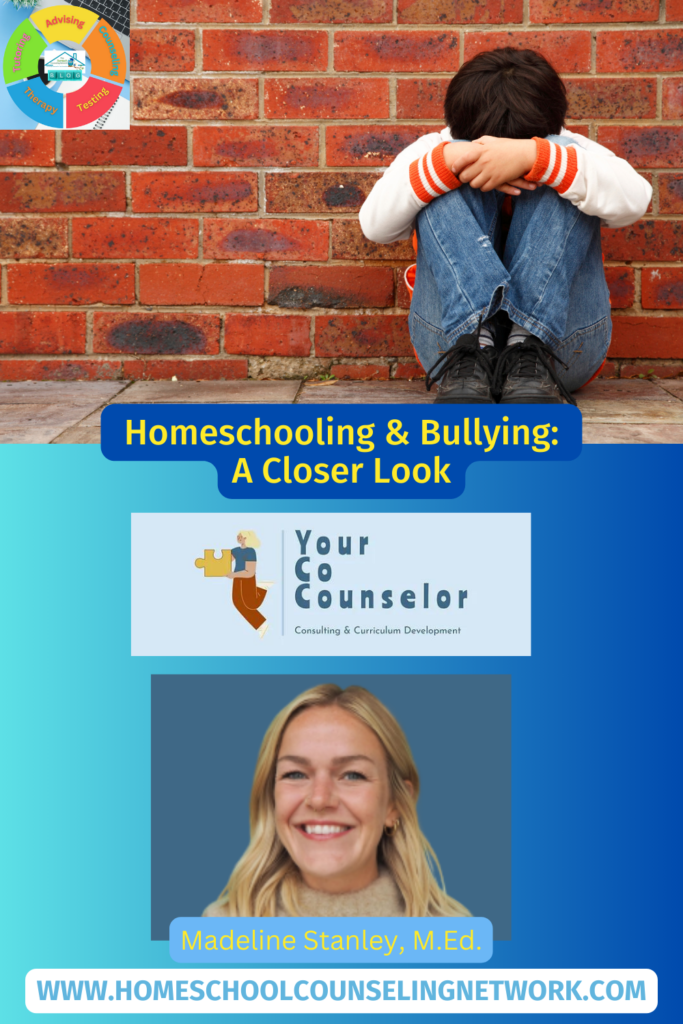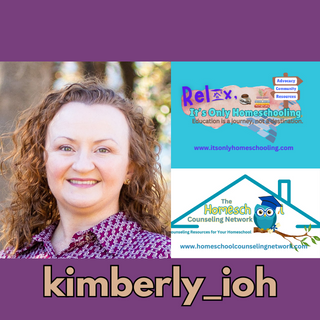Homeschooling and Bullying: A Closer Look by HCN Guest Blogger Madeline Stanley

October is National Bullying Prevention Month.
Each year, hundreds of families across the nation (and the world!) decide to
homeschool their children, a decision that is as nuanced as it is personal. One reason to
consider? Bullying.
So, what is bullying? According to stopbullying.gov, in its simplest form, bullying is “an
unwanted, aggressive behavior (typically) among school-aged children that involves a real or
perceived power imbalance.”
Often, instances of bullying occur repeatedly, feeding into the cycle of imbalance and causing lasting psychological and sometimes physical damage. While you may be conjuring a scene of bullying from a classic Hollywood film, in real life, bullying can be much more challenging to identify. To start, here are four types of bullying to be familiar with:
● Physical bullying: hurting someone’s body, like hitting, kicking, or taking their things.
● Verbal bullying: saying mean things to someone, like teasing, name-calling, or making
fun of them.
● Social bullying: trying to hurt someone’s feelings or reputation by spreading rumors or
purposefully excluding them.
● Cyberbullying: being mean to someone online, like sending hurtful messages (publicly
or privately) or posting embarrassing pictures.
Whether the intention is to prevent or avoid it, parents from coast to coast are taking control of their children’s learning environments to reduce their risk of falling victim to a bully. Many
parents mistakenly believe that homeschooling protects children from the harsh realities of
bullying, but unfortunately, that simply isn’t true. While bullying may have been a driving factor in your family’s change in schooling scenery, it can happen anywhere. Even in homeschooling
communities.

Creating a Social Network for Homeschoolers
Of course, homeschooled children thrive on social interaction and skill development just as
much as their peers in traditional schools, so consciously building a solid social network is
crucial for their emotional well-being. Plus, it can even act as a buffer against bullying,
regardless of where they learn!
By giving kids the opportunity to test out their social skills organically, they will develop their communication, cooperation, and empathy while growing their confidence and friendship circles. A strong, connected social system within a group of kids with similar interests and lifestyles can also help children to identify and report incidents of bullying, in turn creating a safer environment for everyone involved.
Homeschooling families can cultivate community by actively seeking opportunities for their
children to connect, such as joining interesting clubs, sports teams, or even homeschool co-ops
in the area or online! Additionally, fostering empathy and social skills through role-playing and
social-emotional learning activities give children the chance to hone in on valuable skills for
navigating social situations that they may not encounter day-to-day.
In today’s digital age, and with online schooling programs on the rise, it’s equally important to educate children about online safety to prevent cyberbullying and create a positive and enriching online experience, so you may consider seeking groups or programs to cover this challenging but essential topic.
Looking for more tips on building social connections for you and your kids? Check out this
article!
Recognizing and Responding to Signs of Bullying in Homeschooled Children
Recognizing the signs of bullying in a homeschooled child can be tricky because they may not
exhibit the same overt behaviors as their peers in traditional school, which most “bullying signs
to look out for” data and writings target. For example, a kid being bullied on the playground may ask to stay inside and help the teacher organize markers by color at recess, whereas a
homeschooled kid may find it more difficult to weasel out of their online program or a family-
sanctioned event to meet up with supposed friends in the area.
But don’t worry, as a homeschooler, you are well-equipped to notice the ever-evolving emotions of the growing people you interact with every day, including behavior changes that may indicate signs of bullying. Here are a few universally common indicators to look out for:
● Apparent changes in mood or demeanor, such as increased sadness, anxiety, or
irritability (especially around certain events or activities)
● Social withdrawal or lack of interest in things that they usually enjoy, including seclusion
from family activities
● Unexplained academic decline or a change in motivation, particularly toward a specific
topic or activity
● Physical complaints without an apparent cause (such as stomach aches, headaches, or
fatigue) may be signs of distress or anxiety
As adults, it stings to hear about kids’ friendship issues. Luckily, friendship skills are learned! So
here are a few ways you can empower your kids to build healthy, happy social connections that
start at home:
● Spend time together: Plan for intentional family meals, open conversations, and shared
activities.
● Listen up: Ask kids open-ended questions and really listen to their answers. Stumped?
Start with the 5 W’s:
● Who did you play with today?
● What did you do today that was creative/challenging/etc.?
● When was the happiest moment of your day?
● Where did you see kindness today?
● Is there a part of the day you would change? If so, why?
● Model healthy relationships: Treat everyone with kindness and respect, just like you’d
want your kid to do!
● Nurture connection: Show (and tell) your child you care by validating their emotions
and expressing your love with words, actions, and thoughtful gestures.
● Create shared traditions: Establish family rituals like movie nights or birthday
celebrations and recognize accomplishments, big or small.
● Set up playdates: Help your kids practice social skills while making real-world, cognitive
connections through creative play with others.
Empowering Through Homeschooling: A Path Forward
If you are considering homeschooling in the wake of traditional school tormentors, know that a
customized learning environment can be a lifeline for children who have experienced bullying.
By aligning your child’s education with your family’s beliefs and your kid’s specific needs, strengths, and interests, homeschooling can foster a sense of control and autonomy for the whole family.
Adapted, aligned homeschool environments empower children to rebuild their self-esteem and confidence, which are often shattered by bullying, in a setting that is safe, both physically and emotionally. Plus, removing your child from the traditional school setting will significantly reduce, if not eliminate, their exposure to potential bullies and allow them to progress at their own pace, both reducing academic stress and allowing your child to thrive in ways they may not have been equipped to otherwise.
Remember, you are your child’s first and most important teacher. With a little love, patience,
and creativity, you can create an amazing space for learning academically, socially, and
emotionally right at home. You’ve got this!
About the Author

Want To Write For Us?
Learn more about how you can become a guest blogger for The Homeschool Counseling Network here.

Let’s Keep In Touch
Be sure you do not miss a blog post by signing up for our newsletter or joining our Facebook group.
Blessings,
Kimberly Bennett, LPC
Founder/CEO It’s Only Homeschooling
Founder/CEO The Homeschool Counseling Network

This website is not a professional counseling website and nothing here should be construed as professional counseling advice. Although Kimberly Bennett, LPC is a Licensed Professional Counselor, she is not your counselor, and no counselor-client relationship is established unless she has signed an agreement with you. All information provided through this website is for informational and educational purposes only.